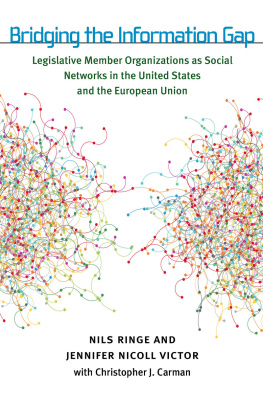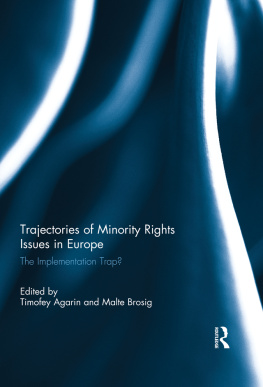COMPLIANCE IN THE ENLARGED EUROPEAN UNION
Compliance in the Enlarged European Union
Living Rights or Dead Letters?
GERDA FALKNER
Institute for European Integration Research of the Austrian Academy of Sciences, Vienna
OLIVER TREIB
Institute for Advanced Studies, Austria
ELISABETH HOLZLEITHNER
University of Vienna, Austria
with
EMMANUELLE CAUSSE, PETRA FURTLEHNER, MARIANNE SCHULZE and CLEMENS WIEDERMANN
First published 2008 by Ashgate Publishing
Published 2016 by Routledge
2 Park Square, Milton Park, Abingdon, Oxon OX14 4RN
711 Third Avenue, New York, NY 10017, USA
Routledge is an imprint of the Taylor & Francis Group, an informa business
Copyright Gerda Falkner, Oliver Treib and Elisabeth Holzleithner 2008
Gerda Falkner, Oliver Treib and Elisabeth Holzleithner have asserted their right under the Copyright, Designs and Patents Act, 1988, to be identified as the authors of this work.
All rights reserved. No part of this book may be reprinted or reproduced or utilised in any form or by any electronic, mechanical, or other means, now known or hereafter invented, including photocopying and recording, or in any information storage or retrieval system, without permission in writing from the publishers.
Notice:
Product or corporate names may be trademarks or registered trademarks, and are used only for identification and explanation without intent to infringe.
British Library Cataloguing in Publication Data
Compliance in the enlarged European Union : living rights or dead letters?
1. Social legislation - European Union countries I. Falkner, Gerda II. Treib, Oliver III. Holzleithner, Elisabeth
344.2'401
Library of Congress Cataloging-in-Publication Data
Falkner, Gerda.
Compliance in the enlarged European Union : living rights or dead letters? / by Gerda Falkner, Oliver Treib and Elisabeth Holzleithner.
p. cm.
Includes bibliographical references and index.
ISBN 978-0-7546-7509-9
1. Law--European Union countries. 2. International and municipal law--European Union countries. 3. Effectiveness and validity of law--European Union countries. 4. Compliance. 5. European Union countries--Social policy. I. Treib, Oliver. II. Holzleithner, Elisabeth,
1970- III. Title.
KJE5057.F35 2008
341.242'2--dc22
2008018466
ISBN 9780754675099 (hbk)
Contents
Gerda Falkner, Oliver Treib and Elisabeth Holzleithner
Clemens Wiedermann
Emmanuelle Causse
Marianne Schulze
Petra Furtlehner
Oliver Treib and Gerda Falkner
This book is the result of a perennial research project supported by the Austrian Ministry of Science under the TRA FO programme for transdisciplinary research (whose funding is gratefully acknowledged).
We trust that our dedication to teamwork and discourse across disciplinary boundaries has left its mark on the final publication: the chapters follow a stringent plan and the sections on each country are fully synchronised to allow for direct comparison. All parts were read and commented on multiple times by all coauthors, and several sections are based on joint work such as strategy reports and workshop protocols extensively discussed in the entire group.
After some uncertainty about how justice could best be done to the specifics of working in a collaborative empirical project with a group of researchers too large to co-author the project book (in the sense of truly co-writing as a group, in equal work shares, all parts of the text), we decided to follow the suggestion of the publisher to include the names of the project directors on the book cover, and then all names with details on the (main) responsibilities for individual parts of the text inside the book. This is meant to express, from the outset, that the book is a coherent text, much more similar to a co-authored book than to a loose edition collection. The project directors were indeed involved in the entire work: they answer for the overall design of the project, the day-to-day management of the research, the guidance of the group of co-researchers (then all employed for this project at the Political Science Department of the Institute for Advanced Studies in Vienna), and finally for framing and, to a varying extent, for (re-)drafting the chapters.
It is important to mention that, in addition to the authors represented in this book, Andreas Obermaier and Caroline Wrgtter also contributed to the empirical field work during the last phase of the project. We would also like to thank Miriam Hartlapp and the anonymous referees for valuable comments on an earlier version of the manuscript. Our special gratitude goes to the numerous experts and practitioners who participated in our focus groups and strategy workshops or dedicated time to the project in other ways. We are very much indebted to Caroline Wintersgill as the Senior Commissioning Editor of Ashgate, who did a very dedicated and efficient job, and finally to Elisabet Torggler at the Institute for Advanced Studies, who helped us with the layout of the manuscript and with assembling the index.
We would also like to thank the entire group of collaborators for a cooperative experience the results of which will hopefully also be fruitful for the readers of this book. Note that the practitioners not only shared their experience with us but also their hope that dead letters can finally be turned into living rights.
Gerda Falkner (Overall Project Director)
Elisabeth Holzleithner and Oliver Treib (Project Co-Directors)
Gerda Falkner, Oliver Treib and Elisabeth Holzleithner
This chapter begins by outlining the theme of the book: the practice of European Union (EU) social legislation in Central and Eastern European countries (CEECs). We highlight the importance of studying policy implementation as a crucial phase of the policy cycle. We outline the empirical and methodological approach we chose to shed light on how accession countries attempt to translate EU social policies into domestic practice. We also give an overview of the state of the art in EU implementation research, and of the EU legislation pertaining to our study. The chapter closes with a brief description of the structure of the book.
The Theme of the Book: How Does EU Social Law Work in Practice in Central and Eastern Europe?
On 1 May 2004, ten new member states from Central and Eastern Europe and the Mediterranean joined the European Union. They had to align their policies and their administrative and legal systems with the requirements of the acquis communautaire (i.e., the approximately 80,000 pages of EU law representing the status quo of European integration) even before joining and although their policy legacies were in some areas far behind the EU standards. Further, their legal and administrative systems were in need of major reforms to allow the proper enforcement and application in practice of the huge body of EU law.
We aim to take stock of this process. If there are shortcomings in transposition, enforcement or practical application, what are the reasons and how could they eventually be mended? The EU directives on working time, employment equality, and the equal treatment of women and men in employment will serve as our practical examples.













